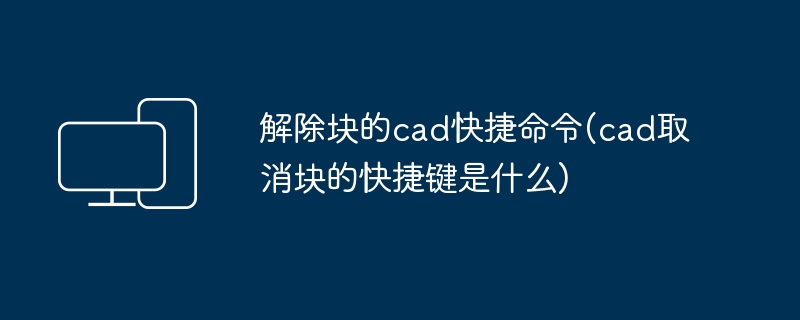Home >Computer Tutorials >Computer Knowledge >cad shortcut command to cancel a block (what is the cad shortcut key to cancel a block)
cad shortcut command to cancel a block (what is the cad shortcut key to cancel a block)
- WBOYWBOYWBOYWBOYWBOYWBOYWBOYWBOYWBOYWBOYWBOYWBOYWBforward
- 2024-02-11 20:30:162136browse

php Xiaobian Xigua introduces you to the CAD shortcut commands for removing blocks. In CAD design, a block is an object composed of a set of graphic elements, through which the design can be easily reused and edited. However, sometimes we need to unblock blocks and return them to normal graphic elements. In CAD, the shortcut key to release a block is "EXPLODE". By pressing the "EXPLODE" key, the selected block can be released and restored to its various graphic elements to facilitate subsequent editing and modification. Mastering this CAD shortcut command can improve design efficiency and make work go more smoothly.
1. Commonly used function keys:
F1: Get help
F2: Switch between drawing window and text window
F3: Control whether to implement Object automatic snapping
F4: Digitizer control
F5: Isometric plane switching
F6: Control how coordinates are displayed on the status line
F7 : Grid display mode control
F8: Orthogonal mode control
F9: Grid snap mode control
F10: Polar mode control
F11 : Object tracking mode control
2. Drawing command:
A: Draw an arc.
B: Definition block.
C: Draw a circle.
D: Dimension Explorer.
E: Delete.
F: Round.
G: Opposite combination.
H: Fill.
I: Insert.
J: docking.
S: Stretch.
W: Define the block and save it to the hard disk.
L: Straight line.
M: Move.
X: Exploded.
V: Set the current coordinates.
U: Resume the last operation.
O: Offset.
P: Move.
Z: Zoom.
3. (Use ALT letters to quickly select commands. This method can quickly operate most software.)
CTRL N New
CTRL O Open
CTRL C Close
CTRL S Save
CTRL A Save as
CTRL V Print preview
CTRL P Print 2. Commonly used CTRL, ALT shortcuts Keys:
ALT TK Like quick selection.
ALT NL Linear dimension ALT VV4 Quickly create four viewports. ALT MUP extracts contours.
Ctrl B: Grid snap mode control (F9).
Ctrl C: Copies the selected object to the clipboard.
Ctrl F: Control whether to implement automatic object capturing (F3).
Ctrl G: Grid display mode control (F7).
Ctrl J: Repeat the previous command.
Ctrl K: Hyperlink.
Ctrl N: Create a new graphic file.
Ctrl M: Open the options dialog box.
Ctrl O: Open the image file.
Ctrl P: Open the print dialog box.
Ctrl S: Save the file.
Ctrl U: Polar mode control (F10).
Ctrl v: Paste the contents of the clipboard.
Ctrl W: Object tracking control (F11).
Ctrl X: Cut the selected content.
Ctrl Y: Redo.
Ctrl Z: Cancel the previous step.
Ctrl 1: Open the properties dialog box.
Ctrl 2: Open the Image Explorer.
Ctrl 3: Open the tool palette.
Ctrl 6: Open the image data atom.
Ctrl 8 or QC: Quick calculator.
4. Dimensioning:
DRA: Radius marking. DDI: diameter designation. DAL: Alignment annotation. DAN: angle annotation. END: Capture the endpoint. MID: Snap to midpoint. INT: Snap to intersection point. CEN: Capture the center of the circle. QUA: Snap to quadrant points. TAN: captures the tangent point.
PER: Catch the drop foot. NOD: capture node. NEA: Captures the closest point. AA: Measurement area and perimeter (area). ID: Specify coordinates. LI: Specify the coordinates of the collective (individual). AL: align. AR: array.
AP: Load *lsp program system. AV: Open the view dialog box (dsviewer). SE: Opens the object automatic snapping dialog box. ST: Open the font setting dialog box (style). SO: Draw a two-dimensional surface (2d solid). SP: Pinyin verification (spell). SC: scale.
SN: Grid snap mode setting (snap). DT: Text setting (dtext). DI: Measures the distance between two points. OI: Insert external objects. RE: Update display. RO: Rotate. LE: Lead label. ST: Single line text input. La: Layer manager.
The following includes 3ds max shortcut keys.
Quick Settings
Move the mouse to the toolbar, click Tools→Customize→Interface and a "Customize User Interface" will pop up.
Click the " " sign in front of "Keyboard Shortcuts", then move down, click the triangle to the right of all commands, then select a custom command, and then press and hold the left mouse button on the command you need. Move to keyboard shortcuts, go to keyboard shortcuts.
Click on the command you just selected. There will be a "key" on the right. Click the "..." on the right of the "key" and a small window will appear. For example, press "Ctrl W" and click OK → Just apply → exit.
The above is the detailed content of cad shortcut command to cancel a block (what is the cad shortcut key to cancel a block). For more information, please follow other related articles on the PHP Chinese website!

